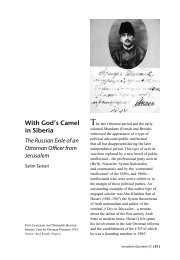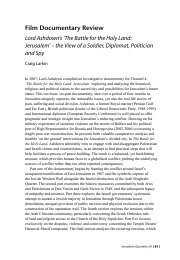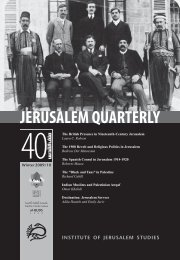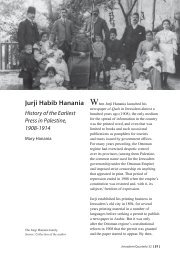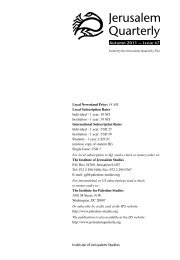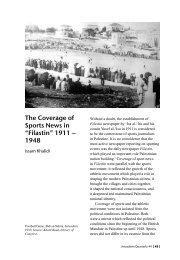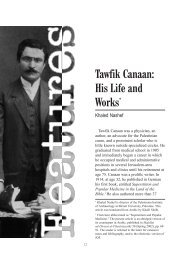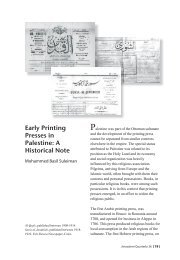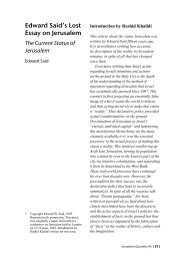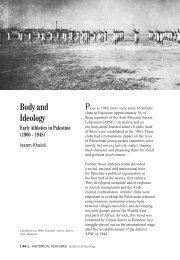PLUNDERING PALESTINE - Jerusalem Quarterly
PLUNDERING PALESTINE - Jerusalem Quarterly
PLUNDERING PALESTINE - Jerusalem Quarterly
Create successful ePaper yourself
Turn your PDF publications into a flip-book with our unique Google optimized e-Paper software.
During the development of the national law, archaeology in Israel metamorphosed<br />
into a national hobby and a tool for enhancing social solidarity, with networks for<br />
establishing national sentiment and allegiance. Israel founds its roots in the tangible<br />
remains of the past. Archaeological focus shifted from questions of chronology and<br />
typology to a larger inquiry into trade relations, social complexity, and the political<br />
structure of past societies. Emphasis was on scientific endeavours seeking to add<br />
to the global discussions of archaeological method and theory. 28 New arrivals to<br />
the nascent state all wanted to dig up a piece of their heritage in order to connect<br />
with their ancestors. The demand for antiquities was burgeoning. Simultaneously,<br />
avid collectors like Teddy Kollek and Moshe Dayan were in positions of political<br />
power, acting on behalf of the dealing and collecting communities to ensure that the<br />
traditional enterprise of dealing in antiquities would be allowed to continue, and in<br />
fact, be sanctioned by the government through new heritage legislation.<br />
The AL 1978 has been considered both progressive and regressive. It has been noted<br />
that during the 1970s when it was enacted, the AL 1978 legislation was considered<br />
forward-thinking, particularly its requirement of full scientific publication for<br />
archaeological excavations. 29 Contrary to the progressive understandings of the law,<br />
however, the AL 1978 creates a paradoxical situation whereby excavation without<br />
a permit is banned, but provisions for a trade in archaeological material acquired<br />
prior to the enactment of the AL 1978 make Israel what has been referred to as a<br />
“collector’s paradise”. 30 In conjunction with military orders no. 462 and no. 1166,<br />
which potentially encourage the movement (with approval of the civil administrator)<br />
of material from Palestine, this ironic situation ensures the perpetuation of the market<br />
in antiquities–there is a seemingly unending supply.<br />
In 1989, Israel passed another antiquities law, which established the IAA and<br />
articulated the various bodies associated with archaeological site protection<br />
(Antiquities Authority Law 5749-1989) or AL 1989. The preamble of the law states:<br />
“The Law of the Israel Antiquities Authority states that the IAA is the organization<br />
responsible for all the antiquities of the country, including the underwater finds. The<br />
IAA is authorized to excavate, preserve, conserve and administrate antiquities when<br />
necessary.” Chapter four, sections 25-26, establish inspectors and give them the right<br />
to conduct searches of suspected offences against the AL 1978. Out of this provision<br />
for inspectors developed the anti-theft unit, whose purpose is to oversee the licensing<br />
of private antiquities dealers. The anti-theft unit ensures that licensed export is<br />
permitted in accordance with conditions of the law and its regulations. This unit of the<br />
IAA is responsible for inspecting commerce in antiquities.<br />
In 2002, amendments were made to the AL 1978, which included some new directives<br />
for dealers in antiquities. Added to AL 1978 were the statements:<br />
<strong>Jerusalem</strong> <strong>Quarterly</strong> 33 [ 29 ]


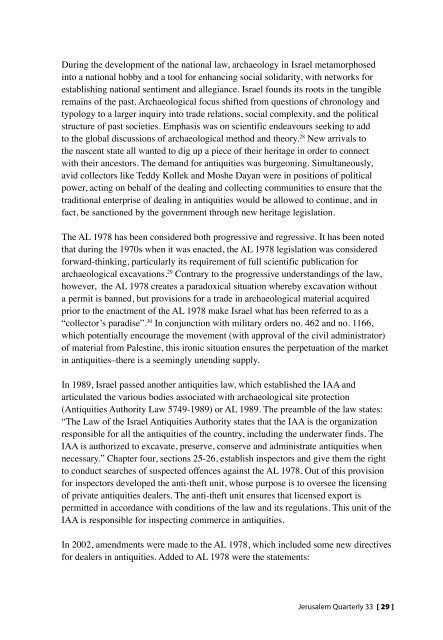
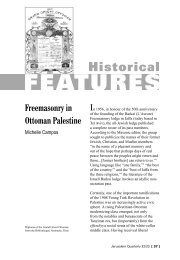
![In Search of Jerusalem Airport [pdf] - Jerusalem Quarterly](https://img.yumpu.com/49007736/1/180x260/in-search-of-jerusalem-airport-pdf-jerusalem-quarterly.jpg?quality=85)

